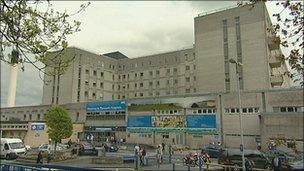Doctors 'not trained to use life-saving equipment'
- Published

Resuscitation equipment at the hospital was missing parts
Doctors called to help resuscitate a patient at a hospital in Devon had not been trained to use life-saving equipment, an inquest has heard.
Cecil Barnes, from Plymouth, was 79 when he died in Derriford Hospital in July 2008.
He had experienced breathing problems while recovering from an operation.
David Bowen, resuscitation officer responsible for training hospital staff, said he had not shown employees how to use the relevant equipment.
The inquest at the Copthorne hotel in Plymouth was told staff were unable to clear Mr Barnes' airway, despite using three different sets of suction kit.
Mr Bowen said he had expected the training to be done on the ward.
'Damaged' equipment
However, Dr Michael Powers, the barrister for Mr Barnes' family, said one of the emergency team doctors called to help resuscitate Mr Barnes had said doctors had not been taught how to use the emergency equipment.
He said another doctor in the resuscitation team had told him he had not been shown how to operate the equipment on the resuscitation or crash trolley.
Mr Barnes, originally from Levant in Cornwall, had an operation to remove his bladder in July 2008.
His surgeon, Esther McClarty, said the operation had gone ahead without complications and Mr Barnes had been progressing well.
'Shocked'
However, six days later, Mr Barnes was violently sick and inhaled vomit.
Staff on Lyd Ward trying to clear his airway were unable to make equipment work, the inquest heard.
Junior Sister Elizabeth Richardson said colleagues had called out "How does it work?" and "How do you turn it on?".
She had been "thoroughly shocked and upset by the experience", which was the first time during a cardiac arrest that it had not been possible to clear a patient's airways with suction.
Pathologist Dr Paul McCullagh said the cause of Mr Barnes' death was heart and lung failure and bronchial pneumonia due to aspiration, or inhalation, of stomach contents.
The hearing continues.
- Published15 November 2010